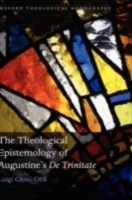Detailansicht
Theological Epistemology of Augustine's De Trinitate
eBook - Oxford Theology and Religion Monographs
ISBN/EAN: 9780191564772
Umbreit-Nr.: 3523082
Sprache:
Englisch
Umfang: 352 S.
Format in cm:
Einband:
Keine Angabe
Erschienen am 06.11.2008
Auflage: 1/2008
E-Book
Format: PDF
DRM: Adobe DRM
- Zusatztext
- Luigi Gioia provides a fresh description and analysis of Augustine's monumental treatise, De Trinitate, working on a supposition of its unity and its coherence from structural, rhetorical, and theological points of view. The main arguments of the treatise are reviewed first: Scripture and the mystery of the Trinity; discussion of 'Arian' logical and ontological categories; a comparison between the process of knowledge and formal aspects of the confession ofthe mystery of the Trinity; an account of the so called 'psychological analogies'. These topics hold a predominantly instructive or polemical function. The unity and the coherence of the treatise become apparent especially when its description focuses on a truly theological understanding of knowledge of God:Augustine aims at leading the reader to the vision and enjoyment of God the Trinity, in whose image we are created. This mystagogical aspect of the rhetoric of De Trinitate is unfolded through Christology, soteriology, doctrine of the Holy Spirit and doctrine of revelation. At the same time, from the vantage point of love, Augustine detects and powerfully depicts the epistemological consequences of human sinfulness, thus unmasking the fundamental deficiency of received theories ofknowledge. Only love restores knowledge and enables philosophers to yield to the injunction which resumes philosophical enterprise as a whole, namely 'know thyself'.
- Kurztext
- Luigi Gioia provides a fresh description and analysis of Augustine's monumental treatise, De Trinitate, working on a supposition of its unity and its coherence from structural, rhetorical, and theological points of view. The main arguments of the treatise are reviewed first: Scripture and the mystery of the Trinity; discussion of 'Arian' logical and ontological categories; a comparison between the process of knowledge and formal aspects of the confession ofthe mystery of the Trinity; an account of the so called 'psychological analogies'. These topics hold a predominantly instructive or polemical function. The unity and the coherence of the treatise become apparent especially when its description focuses on a truly theological understanding of knowledge of God:Augustine aims at leading the reader to the vision and enjoyment of God the Trinity, in whose image we are created. This mystagogical aspect of the rhetoric of De Trinitate is unfolded through Christology, soteriology, doctrine of the Holy Spirit and doctrine of revelation. At the same time, from the vantage point of love, Augustine detects and powerfully depicts the epistemological consequences of human sinfulness, thus unmasking the fundamental deficiency of received theories of knowledge. Only love restores knowledge and enables philosophers to yield to the injunction which resumes philosophical enterprise as a whole, namely 'know thyself'.
